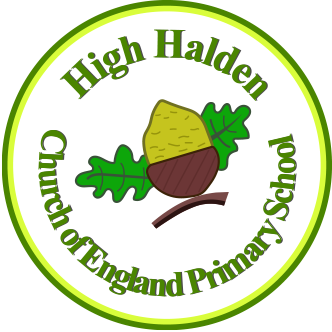History
🏛️ History at High Halden Church of England Primary School
“A people without the knowledge of their past history, origin and culture is like a tree without roots.”
— Marcus Garvey
At High Halden, history is much more than the study of dates and events — it’s about nurturing curious minds to explore their identity, community, and the wider world. With our school’s own rich heritage and deep ties to the local area, we see history as a living subject that helps pupils understand who they are and where they come from.
Our history curriculum is carefully designed to build children’s chronological understanding, historical enquiry skills, and knowledge of significant people, places and events — both local and global. Through a carefully sequenced journey, children learn to ask questions, analyse evidence, explore different viewpoints, and understand cause and consequence. We want them to leave us with a strong sense of identity and a respect for the complexity of human history.
🌱 Early Years – Laying Historical Foundations
In the Early Years, our history curriculum is introduced through the area of learning Understanding the World. Children begin by exploring:
-
Family history and timelines, using family trees to understand past and present
-
Local changes over time, such as how High Halden has changed through generations
-
Significant places and people, helping children appreciate their heritage
-
Transport over time, allowing them to explore change and continuity in everyday life
These early experiences support children in developing a sense of time and a basic understanding of chronology, preparing them for historical learning in Key Stage 1.
🕰️ Key Stage 1 – Significant People, Events and Change
In Years 1 and 2, children continue to explore history through engaging and relatable topics. They begin to ask questions about the past and study:
-
Lives of significant individuals such as Florence Nightingale, Mary Seacole, Samuel Pepys and Mary Anning
-
Changes within living memory, e.g., the history of toys and how they’ve evolved
-
Events beyond living memory, such as the Great Fire of London
-
Developments in transport, using figures like George Stephenson to explore impact over time
Children are introduced to historical enquiry skills, including using artefacts, photos and stories as sources. By comparing people and periods, they begin to understand the impact of individual contributions and how they shaped the world we live in today.
🏛️ Lower Key Stage 2 – Civilisations and Connections
In Years 3 and 4, pupils broaden their understanding of history by studying ancient and early civilisations, building on the foundational knowledge gained in Key Stage 1. Key areas include:
-
Ancient Egypt and the Roman Empire
-
The Iron and Bronze Ages
-
Ancient Greece and its lasting legacy
-
The Victorian era and the reign of Queen Victoria
These topics help children explore complex themes such as leadership, technological advancement, and cultural influence. Children begin to make comparisons across time periods and consider how earlier societies influenced modern Britain.
🌍 Upper Key Stage 2 – Complexity, Legacy and Critical Thinking
In Years 5 and 6, historical study becomes more analytical and thematic. Pupils examine the causes and consequences of major events and compare societies across time and space. Topics include:
-
The Maya and Shang dynasties – their beliefs, achievements and decline
-
World War I and World War II, including both local and global impact
-
The Slave Trade – understanding injustice and its legacy
-
Crime and punishment through time, comparing systems from Roman to modern Britain
-
The Tudors and the changing power of monarchs
-
Local history study, deepening understanding of how national events shaped High Halden
Throughout these studies, pupils consider continuity and change, significance, and historical perspectives. They develop the confidence to interpret and question sources, form evidence-based conclusions, and communicate their understanding in thoughtful ways.
🔁 Curriculum Design and Progression
Our history curriculum is designed with clear progression in knowledge and skills. Key concepts and "golden threads" — such as leadership, change over time, power, conflict and innovation — are revisited and deepened year after year. This ensures pupils:
-
Know more – by building historical knowledge of people, places and cultures
-
Remember more – through explicit links and chronological frameworks
-
Can do more – by applying enquiry skills, evaluating sources and forming arguments
We believe that a strong grasp of history empowers children to make sense of the present and shape a better future.
🧠 How We Teach History
Every historical unit follows a consistent approach:
-
Establish historical context – Where and when are we in history?
-
Use and evaluate sources – What can we learn from evidence?
-
Ask and explore enquiry questions – Why did this happen? What was the impact?
-
Communicate understanding – Through writing, drama, debate or creative projects
This structure helps children move from curiosity to clarity, fostering deep understanding and encouraging independent thinking.
🏡 Local History – Connecting Past and Place
Our local history studies — beginning in Early Years and culminating in Year 6 — give children the opportunity to explore the story of High Halden, including:
-
The heritage of the school and village
-
Local links to national events
-
How the past has shaped the community we live in today
By grounding history in what is familiar, children develop a deeper appreciation of how national and global history connects with their own lives.
🌟 Our Aim
At High Halden, we want every child to leave our school with a deep respect for history, a strong understanding of chronology and enquiry, and the ability to form thoughtful, evidence-based views about the past. History helps children become more empathetic, informed and empowered citizens — and that’s what we strive for in every lesson.
Here's what the children will be learning about this academic year:


